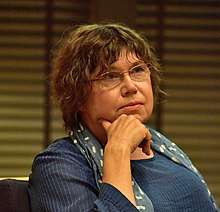Barbara Engelking
Barbara Engelking (born 1962) is a Polish sociologist specializing in Holocaust studies.[1][2] The founder and director of the Polish Center for Holocaust Research in Warsaw, she is the author or editor of several works on the Holocaust in Poland.
Barbara Engelking | |
|---|---|
 | |
| Born | 1962 Warsaw, Poland |
| Academic background | |
| Alma mater | Polish Academy of Sciences University of Warsaw |
| Academic work | |
| Era | 20th century |
| Institutions | Polish Center for Holocaust Research |
| Main interests | Holocaust in Poland |
Education and career
Born in Warsaw, Engelking received an M.A. in psychology from the University of Warsaw in 1988 and a Ph.D. in sociology from the Polish Academy of Sciences, also in Warsaw,[1] for a thesis on The Experience of the Holocaust and its Consequences in Autobiographical Accounts (1993).[3]
Since 1993 Engelking has been an assistant then associate professor at the Polish Center for Holocaust Research, part of the Institute of Philosophy and Sociology at the Polish Academy of Sciences.[3] Since 2014 she has been chair of Poland's International Auschwitz Council.[4][5] From November 2015 until April 2016, she was the Ina Levine Invitational Scholar at the United States Holocaust Memorial Museum Mandel Center in Washington, D.C.[1]
Works
Engelking's book The Warsaw Ghetto: A Guide to the Perished City (2009), written with Jacek Leociak, provides detailed maps of the ghetto so that readers can locate the streets and former community structures. Michael Marrus described it as "a stunning work, one of the most important books on the history of the Nazi Holocaust".[6]
In a review of Engelking's book Such a Beautiful Sunny Day: Jews Seeking Refuge in the Polish Countryside, 1942–1945 (2016), first published in Polish in 2012, Grzegorz Rossoliński-Liebe wrote that it challenged the German tendency to neglect non-German Holocaust perpetrators, as well as the Polish tendency to view Poles in German-occupied Poland solely as victims.[7] In 2013 historian Samuel Kassow described Engelking's work and that of three other scholars (Jan Grabowski, Alina Skibińska, and Dariusz Libionka) as a "historical achievement of the first order", undermining "the self-serving myths about Polish-Jewish relations in World War II".[8]
In 2018 Engelking and Grabowski co-edited Dalej jest noc: losy Żydów w wybranych powiatach okupowanej Polski ("Night Continues: the Fate of Jews in Selected Counties of Occupied Poland"), a two-volume, 1,600-page study of nine counties in German-occupied Poland during the Holocaust.[9]
Selected works
- (2001). Holocaust and Memory: The Experience of the Holocaust and its Consequences. London: Leicester University Press (edited by Gunnar S. Paulsson). ISBN 978-0718501594
- (2009) with Jacek Leociak. The Warsaw Ghetto: A Guide to the Perished City. New Haven: Yale University Press. ISBN 978-0300112344[6]
- (2009) with Dariusz Libionka. Żydzi w powstanńczej Warszawie. Polish Center for Holocaust Research. ISBN 978-8392683117[10]
- (2016). Such a Beautiful Sunny Day: Jews Seeking Refuge in the Polish Countryside, 1942–1945. Jerusalem: Yad Vashem. ISBN 978-9653085411
- (2018) with Jan Grabowski (eds.). Dalej jest noc. Losy Żydów w wybranych powiatach okupowanej Polski [Night Continues: the Fates of Jews in Selected Counties of Occupied Poland], 2 volumes. Warsaw: Centrum Badań nad Zagładą Żydów [Center for Research into the Extermination of the Jews]. ISBN 978-8363444648 ISBN 978-8363444587[11]
References
- "Fellow Dr. Barbara Engelking". United States Holocaust Memorial Museum. Archived from the original on 2 December 2018.
- Heller, Aron (16 March 2017). "Polish historian's book on killing of Jews exposes raw nerve". The Times of Israel. Associated Press.
- "Barbara Engelking". Polish Center for Holocaust Research. Archived from the original on 2 March 2019.
- "IAC Members". Auschwitz-Birkenau Memorial and Museum. Archived from the original on 28 May 2019.
- Petelewicz, Jakub (25 April 2016). "Partner in EHRI: the Polish Center for Holocaust Research". European Holocaust Research Infrastructure. Archived from the original on 20 June 2019. Retrieved 20 June 2019.
- Marrus, Michael R. (28 August 2009). "Review: The Warsaw Ghetto: A Guide to the Perished City, by Barbara Engelking and Jacek Leociak". The Globe and Mail. Archived from the original on 14 June 2019.
- Rossolinski-Liebe, Grzegorz (18 April 2012). "Sammelrezension: Polnische Beteiligung am Holocaust" [Collective review: Polish participation in the Holocaust]. H-Soz-Kult (in German). Retrieved 1 December 2018.
- Kassow, Samuel (2013). "Essay review of: Jan Grabowski, Judenjagd, B. Engelking, Jest Taki Piekny Sloneczny dzien and B. Engelking and J. Grabowski, Zarys Krajobrazu". Yad Vashem Studies. v. 41 (1): 216–217.
- Study says Polish neighbors betrayed many more Jews than previously thought, Jewish Telegraphic Agency, 11 May 2018.
- Syder, Timothy (24 June 2010). "Jews, Poles & Nazis: The Terrible History". The New York Review of Books. Archived from the original on 14 April 2016.
- Bill, Stanley (29 July 2018). "Poles and the Holocaust: New Research, Old Controversies". Notes from Poland. Archived from the original on 20 June 2019. Retrieved 20 June 2019.